PICO Worksheet: Breathing Exercises & Cardiac Surgery Recovery
VerifiedAdded on 2023/04/08
|7
|936
|225
Homework Assignment
AI Summary
This assignment focuses on applying the PICO (Patient/Problem, Intervention, Comparison, Outcome) framework to investigate the impact of preoperative breathing exercises on reducing postoperative pulmonary complications in patients undergoing cardiac surgery. The assignment includes developing a PICO research question, identifying relevant search terms, creating a systematic search strategy using Boolean operators, and documenting the search process in Medline. It also involves selecting appropriate study types to address the research question and refining the search based on inclusion criteria such as gender, age range, publication dates, and language. The assignment demonstrates a structured approach to evidence-based practice by translating a clinical scenario into a searchable question and planning a systematic search for relevant research articles.
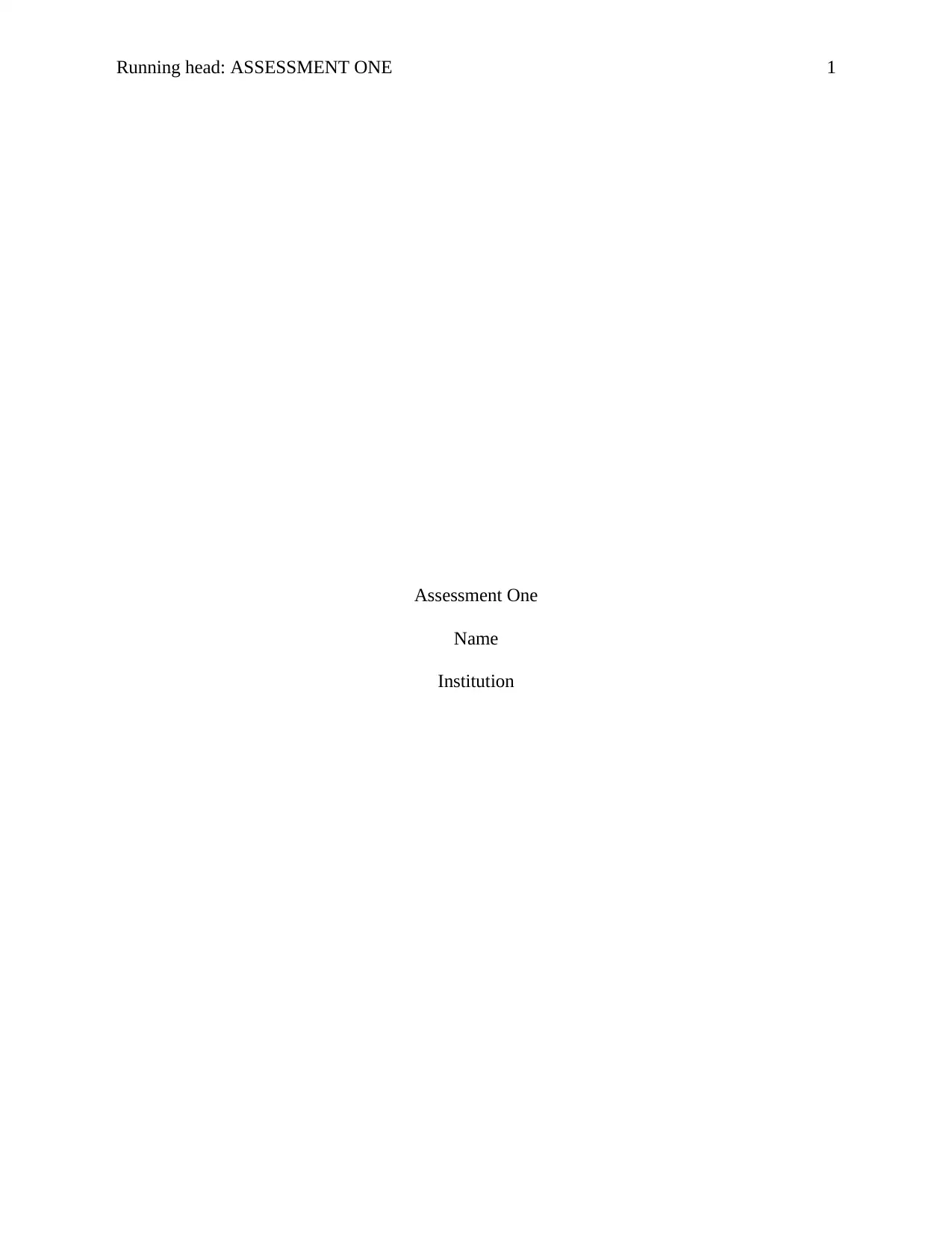
Running head: ASSESSMENT ONE 1
Assessment One
Name
Institution
Assessment One
Name
Institution
Paraphrase This Document
Need a fresh take? Get an instant paraphrase of this document with our AI Paraphraser
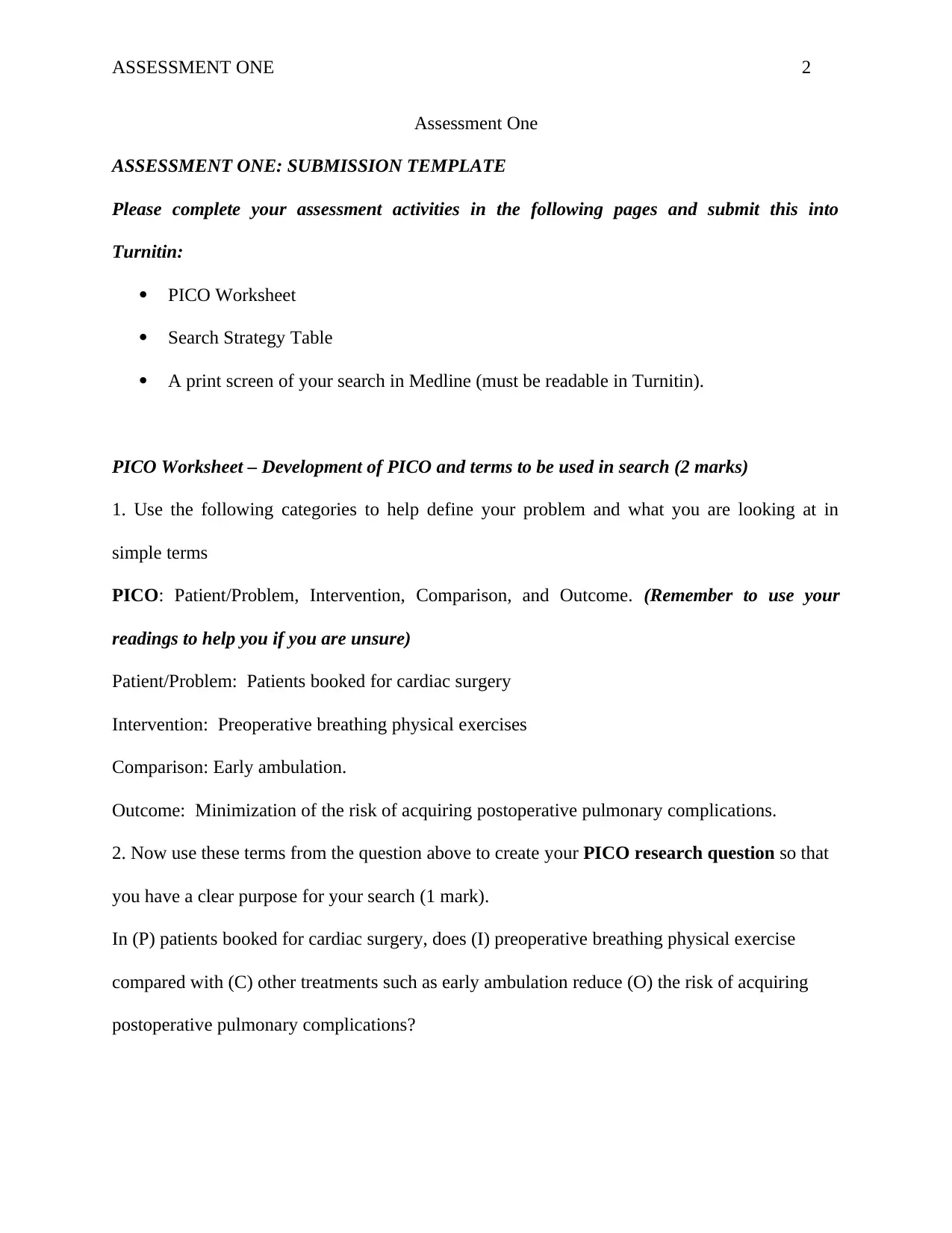
ASSESSMENT ONE 2
Assessment One
ASSESSMENT ONE: SUBMISSION TEMPLATE
Please complete your assessment activities in the following pages and submit this into
Turnitin:
PICO Worksheet
Search Strategy Table
A print screen of your search in Medline (must be readable in Turnitin).
PICO Worksheet – Development of PICO and terms to be used in search (2 marks)
1. Use the following categories to help define your problem and what you are looking at in
simple terms
PICO: Patient/Problem, Intervention, Comparison, and Outcome. (Remember to use your
readings to help you if you are unsure)
Patient/Problem: Patients booked for cardiac surgery
Intervention: Preoperative breathing physical exercises
Comparison: Early ambulation.
Outcome: Minimization of the risk of acquiring postoperative pulmonary complications.
2. Now use these terms from the question above to create your PICO research question so that
you have a clear purpose for your search (1 mark).
In (P) patients booked for cardiac surgery, does (I) preoperative breathing physical exercise
compared with (C) other treatments such as early ambulation reduce (O) the risk of acquiring
postoperative pulmonary complications?
Assessment One
ASSESSMENT ONE: SUBMISSION TEMPLATE
Please complete your assessment activities in the following pages and submit this into
Turnitin:
PICO Worksheet
Search Strategy Table
A print screen of your search in Medline (must be readable in Turnitin).
PICO Worksheet – Development of PICO and terms to be used in search (2 marks)
1. Use the following categories to help define your problem and what you are looking at in
simple terms
PICO: Patient/Problem, Intervention, Comparison, and Outcome. (Remember to use your
readings to help you if you are unsure)
Patient/Problem: Patients booked for cardiac surgery
Intervention: Preoperative breathing physical exercises
Comparison: Early ambulation.
Outcome: Minimization of the risk of acquiring postoperative pulmonary complications.
2. Now use these terms from the question above to create your PICO research question so that
you have a clear purpose for your search (1 mark).
In (P) patients booked for cardiac surgery, does (I) preoperative breathing physical exercise
compared with (C) other treatments such as early ambulation reduce (O) the risk of acquiring
postoperative pulmonary complications?
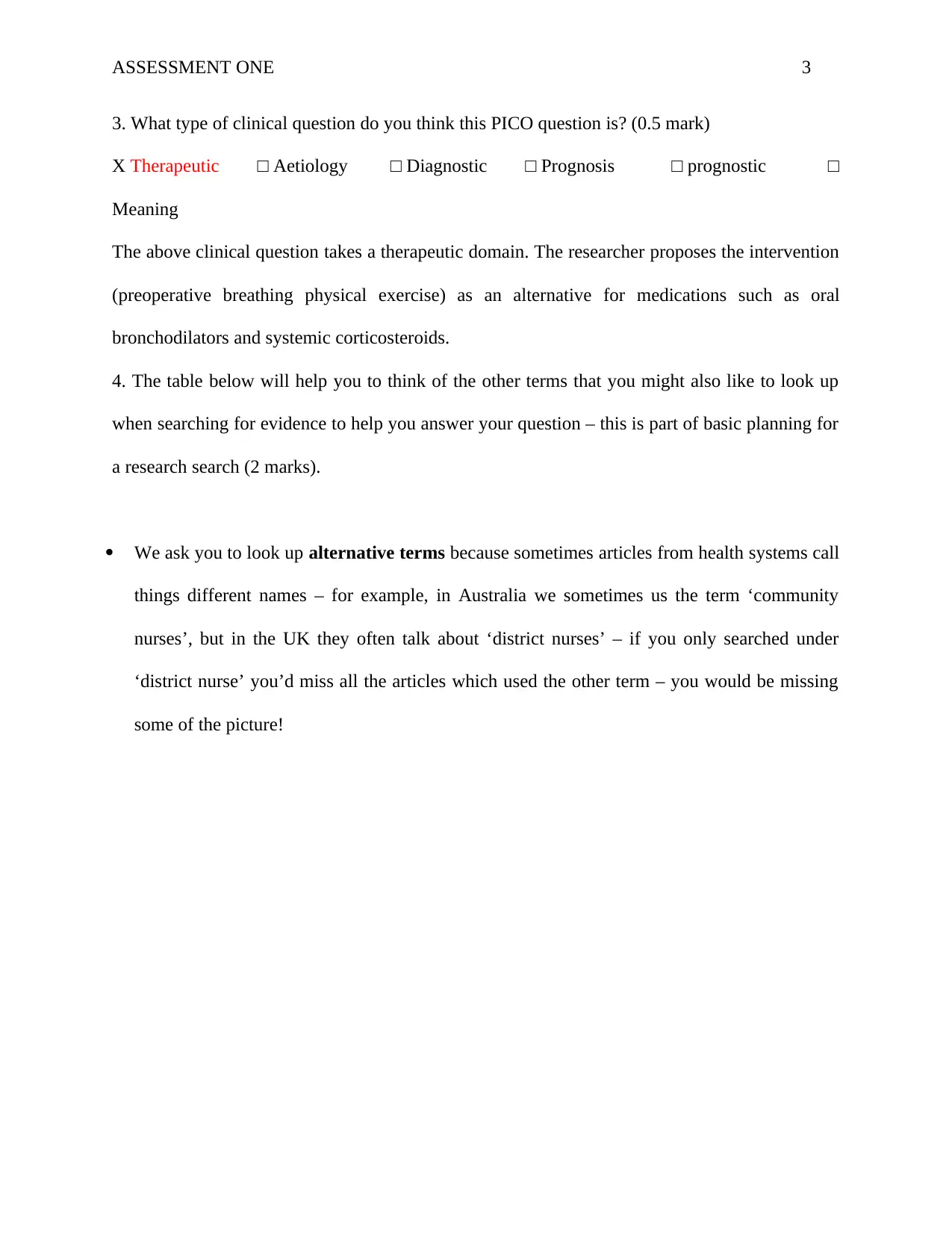
ASSESSMENT ONE 3
3. What type of clinical question do you think this PICO question is? (0.5 mark)
X Therapeutic □ Aetiology □ Diagnostic □ Prognosis □ prognostic □
Meaning
The above clinical question takes a therapeutic domain. The researcher proposes the intervention
(preoperative breathing physical exercise) as an alternative for medications such as oral
bronchodilators and systemic corticosteroids.
4. The table below will help you to think of the other terms that you might also like to look up
when searching for evidence to help you answer your question – this is part of basic planning for
a research search (2 marks).
We ask you to look up alternative terms because sometimes articles from health systems call
things different names – for example, in Australia we sometimes us the term ‘community
nurses’, but in the UK they often talk about ‘district nurses’ – if you only searched under
‘district nurse’ you’d miss all the articles which used the other term – you would be missing
some of the picture!
3. What type of clinical question do you think this PICO question is? (0.5 mark)
X Therapeutic □ Aetiology □ Diagnostic □ Prognosis □ prognostic □
Meaning
The above clinical question takes a therapeutic domain. The researcher proposes the intervention
(preoperative breathing physical exercise) as an alternative for medications such as oral
bronchodilators and systemic corticosteroids.
4. The table below will help you to think of the other terms that you might also like to look up
when searching for evidence to help you answer your question – this is part of basic planning for
a research search (2 marks).
We ask you to look up alternative terms because sometimes articles from health systems call
things different names – for example, in Australia we sometimes us the term ‘community
nurses’, but in the UK they often talk about ‘district nurses’ – if you only searched under
‘district nurse’ you’d miss all the articles which used the other term – you would be missing
some of the picture!
⊘ This is a preview!⊘
Do you want full access?
Subscribe today to unlock all pages.

Trusted by 1+ million students worldwide
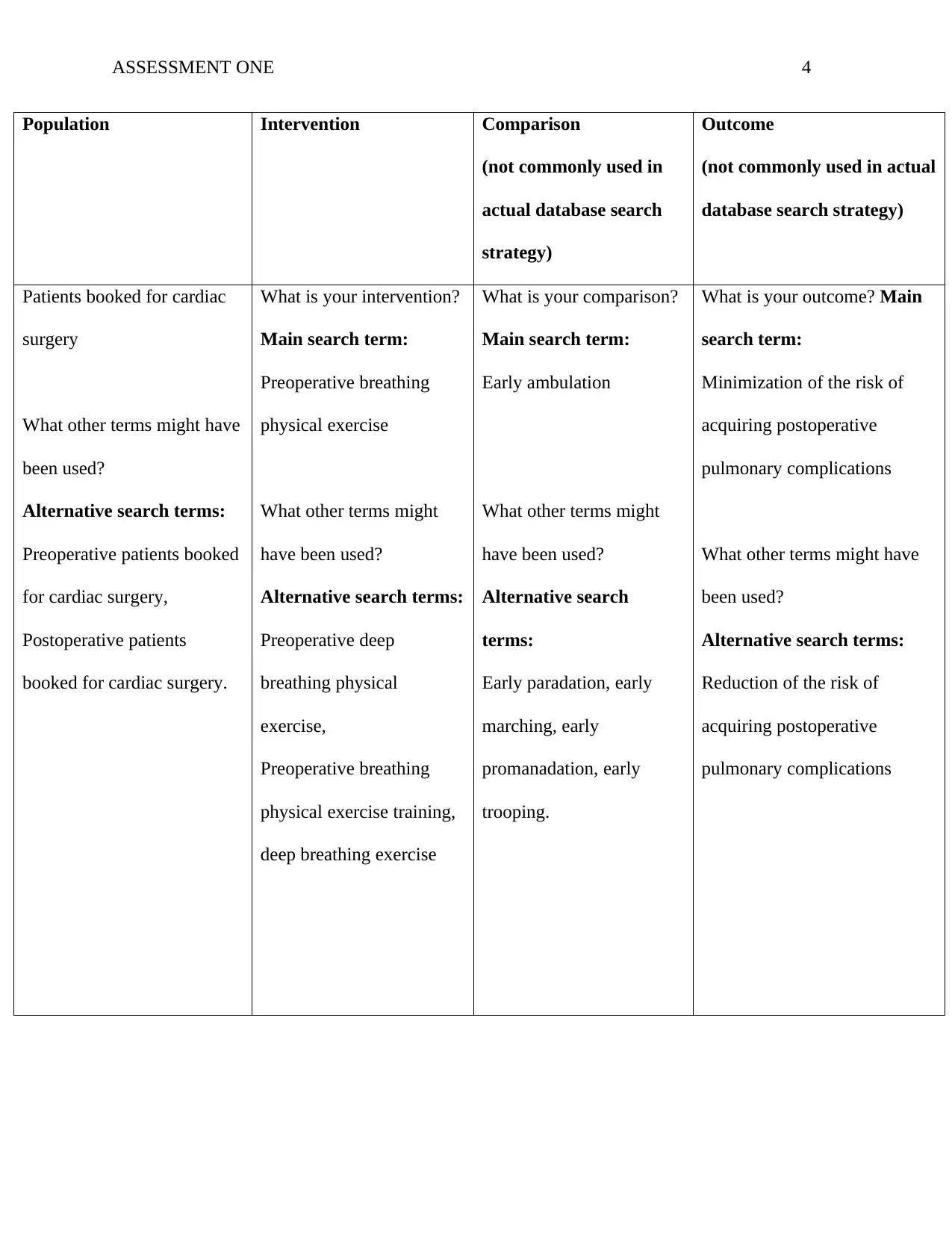
ASSESSMENT ONE 4
Population Intervention Comparison
(not commonly used in
actual database search
strategy)
Outcome
(not commonly used in actual
database search strategy)
Patients booked for cardiac
surgery
What other terms might have
been used?
Alternative search terms:
Preoperative patients booked
for cardiac surgery,
Postoperative patients
booked for cardiac surgery.
What is your intervention?
Main search term:
Preoperative breathing
physical exercise
What other terms might
have been used?
Alternative search terms:
Preoperative deep
breathing physical
exercise,
Preoperative breathing
physical exercise training,
deep breathing exercise
What is your comparison?
Main search term:
Early ambulation
What other terms might
have been used?
Alternative search
terms:
Early paradation, early
marching, early
promanadation, early
trooping.
What is your outcome? Main
search term:
Minimization of the risk of
acquiring postoperative
pulmonary complications
What other terms might have
been used?
Alternative search terms:
Reduction of the risk of
acquiring postoperative
pulmonary complications
Population Intervention Comparison
(not commonly used in
actual database search
strategy)
Outcome
(not commonly used in actual
database search strategy)
Patients booked for cardiac
surgery
What other terms might have
been used?
Alternative search terms:
Preoperative patients booked
for cardiac surgery,
Postoperative patients
booked for cardiac surgery.
What is your intervention?
Main search term:
Preoperative breathing
physical exercise
What other terms might
have been used?
Alternative search terms:
Preoperative deep
breathing physical
exercise,
Preoperative breathing
physical exercise training,
deep breathing exercise
What is your comparison?
Main search term:
Early ambulation
What other terms might
have been used?
Alternative search
terms:
Early paradation, early
marching, early
promanadation, early
trooping.
What is your outcome? Main
search term:
Minimization of the risk of
acquiring postoperative
pulmonary complications
What other terms might have
been used?
Alternative search terms:
Reduction of the risk of
acquiring postoperative
pulmonary complications
Paraphrase This Document
Need a fresh take? Get an instant paraphrase of this document with our AI Paraphraser
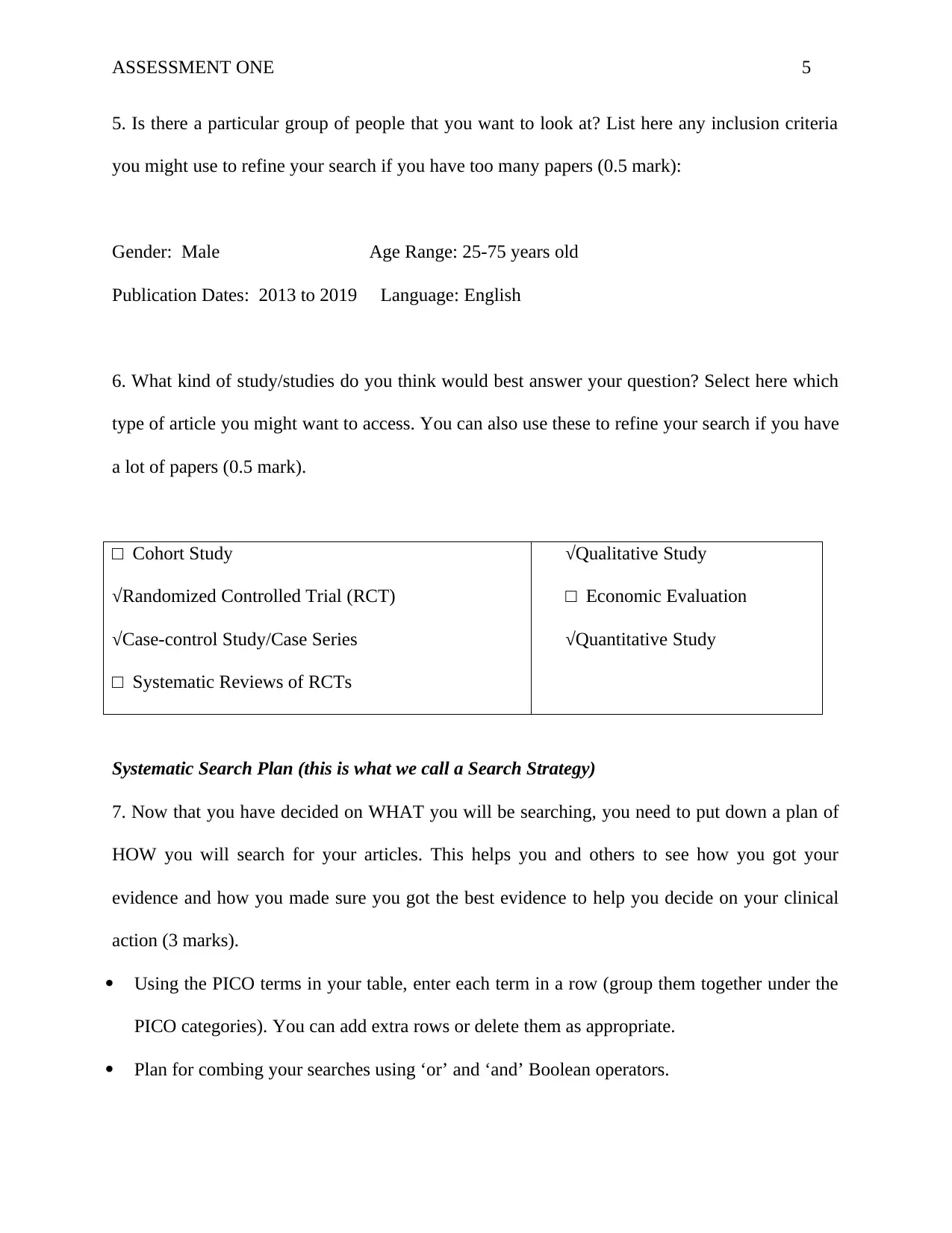
ASSESSMENT ONE 5
5. Is there a particular group of people that you want to look at? List here any inclusion criteria
you might use to refine your search if you have too many papers (0.5 mark):
Gender: Male Age Range: 25-75 years old
Publication Dates: 2013 to 2019 Language: English
6. What kind of study/studies do you think would best answer your question? Select here which
type of article you might want to access. You can also use these to refine your search if you have
a lot of papers (0.5 mark).
□ Cohort Study
√Randomized Controlled Trial (RCT)
√Case-control Study/Case Series
□ Systematic Reviews of RCTs
√Qualitative Study
□ Economic Evaluation
√Quantitative Study
Systematic Search Plan (this is what we call a Search Strategy)
7. Now that you have decided on WHAT you will be searching, you need to put down a plan of
HOW you will search for your articles. This helps you and others to see how you got your
evidence and how you made sure you got the best evidence to help you decide on your clinical
action (3 marks).
Using the PICO terms in your table, enter each term in a row (group them together under the
PICO categories). You can add extra rows or delete them as appropriate.
Plan for combing your searches using ‘or’ and ‘and’ Boolean operators.
5. Is there a particular group of people that you want to look at? List here any inclusion criteria
you might use to refine your search if you have too many papers (0.5 mark):
Gender: Male Age Range: 25-75 years old
Publication Dates: 2013 to 2019 Language: English
6. What kind of study/studies do you think would best answer your question? Select here which
type of article you might want to access. You can also use these to refine your search if you have
a lot of papers (0.5 mark).
□ Cohort Study
√Randomized Controlled Trial (RCT)
√Case-control Study/Case Series
□ Systematic Reviews of RCTs
√Qualitative Study
□ Economic Evaluation
√Quantitative Study
Systematic Search Plan (this is what we call a Search Strategy)
7. Now that you have decided on WHAT you will be searching, you need to put down a plan of
HOW you will search for your articles. This helps you and others to see how you got your
evidence and how you made sure you got the best evidence to help you decide on your clinical
action (3 marks).
Using the PICO terms in your table, enter each term in a row (group them together under the
PICO categories). You can add extra rows or delete them as appropriate.
Plan for combing your searches using ‘or’ and ‘and’ Boolean operators.
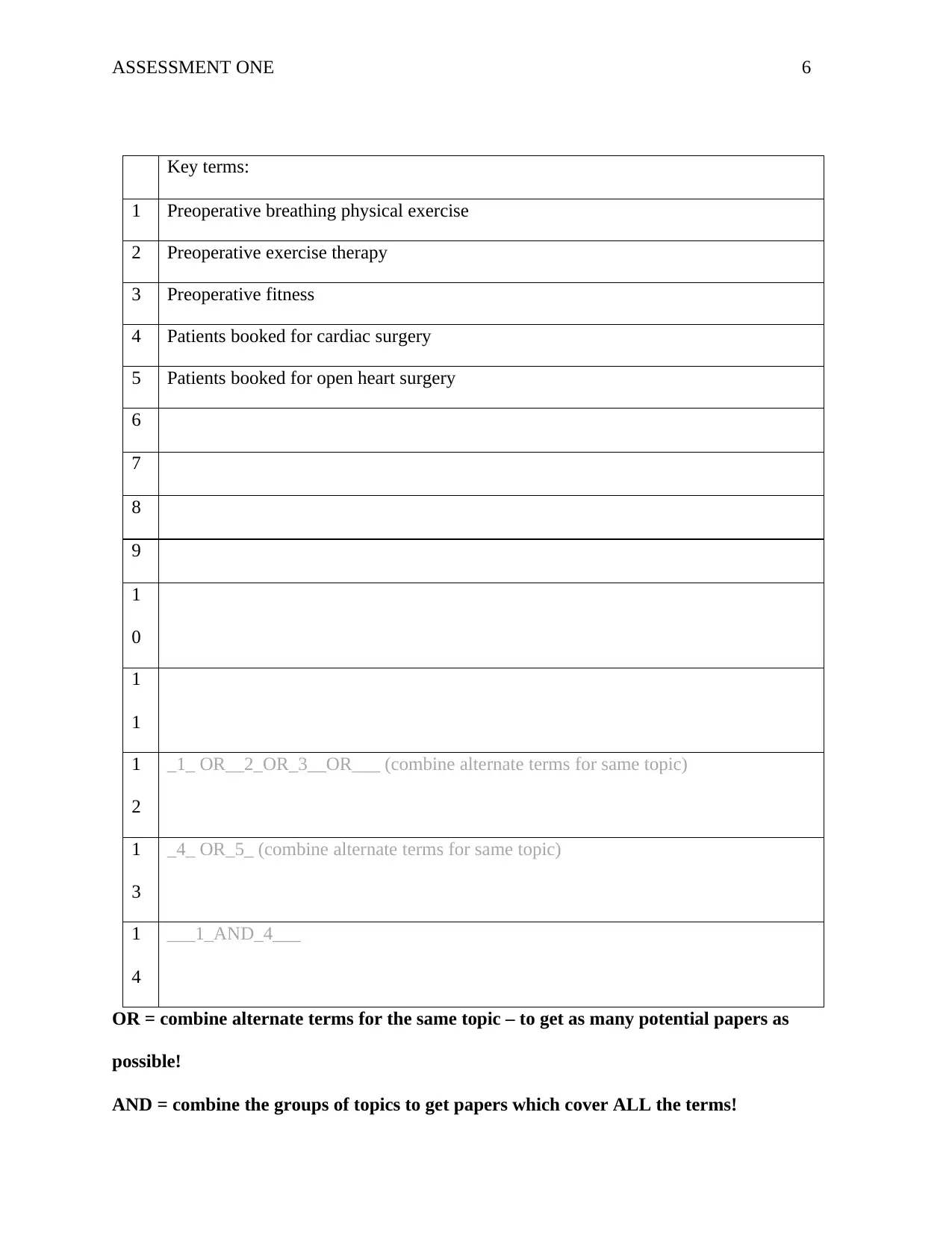
ASSESSMENT ONE 6
Key terms:
1 Preoperative breathing physical exercise
2 Preoperative exercise therapy
3 Preoperative fitness
4 Patients booked for cardiac surgery
5 Patients booked for open heart surgery
6
7
8
9
1
0
1
1
1
2
_1_ OR__2_OR_3__OR___ (combine alternate terms for same topic)
1
3
_4_ OR_5_ (combine alternate terms for same topic)
1
4
___1_AND_4___
OR = combine alternate terms for the same topic – to get as many potential papers as
possible!
AND = combine the groups of topics to get papers which cover ALL the terms!
Key terms:
1 Preoperative breathing physical exercise
2 Preoperative exercise therapy
3 Preoperative fitness
4 Patients booked for cardiac surgery
5 Patients booked for open heart surgery
6
7
8
9
1
0
1
1
1
2
_1_ OR__2_OR_3__OR___ (combine alternate terms for same topic)
1
3
_4_ OR_5_ (combine alternate terms for same topic)
1
4
___1_AND_4___
OR = combine alternate terms for the same topic – to get as many potential papers as
possible!
AND = combine the groups of topics to get papers which cover ALL the terms!
⊘ This is a preview!⊘
Do you want full access?
Subscribe today to unlock all pages.

Trusted by 1+ million students worldwide
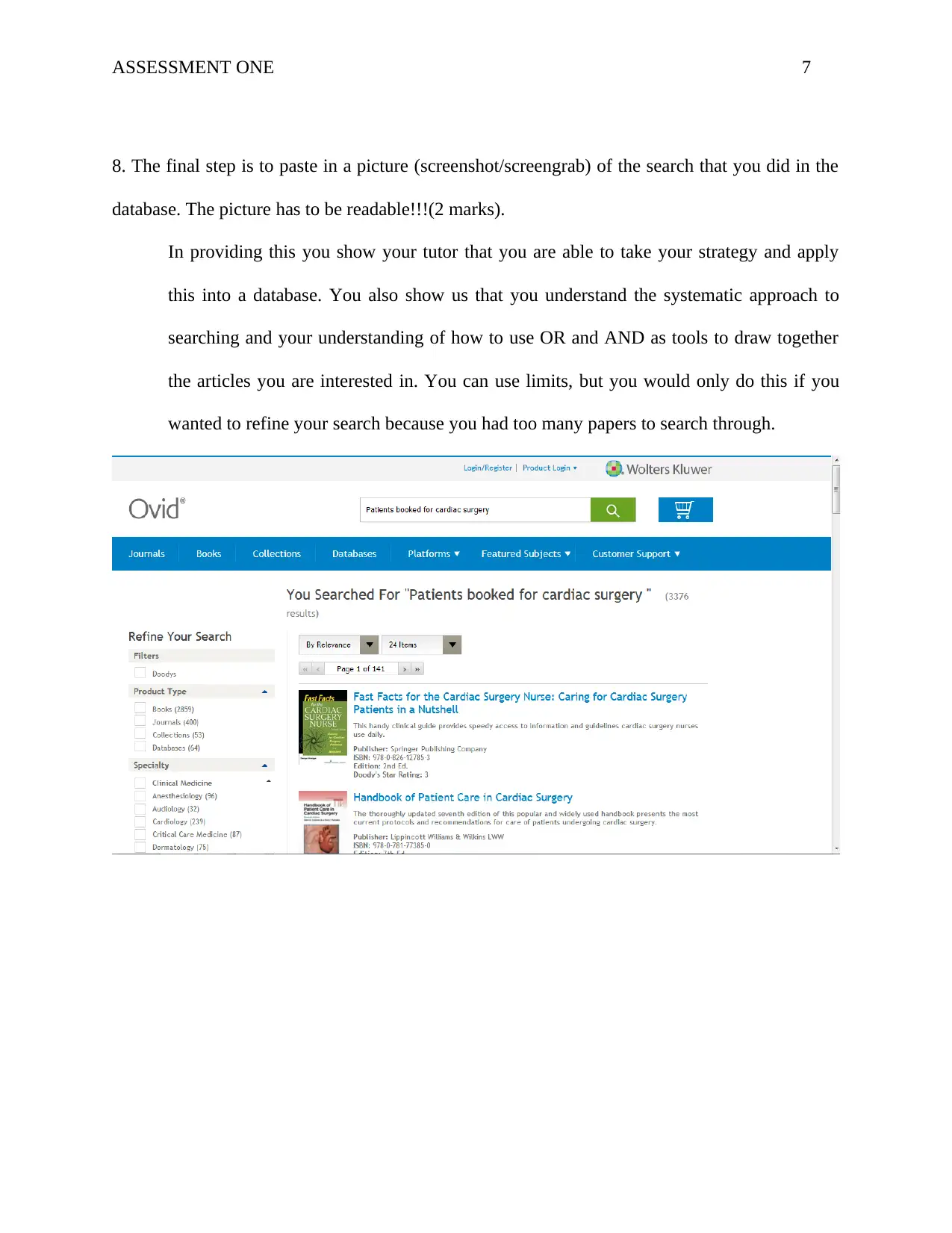
ASSESSMENT ONE 7
8. The final step is to paste in a picture (screenshot/screengrab) of the search that you did in the
database. The picture has to be readable!!!(2 marks).
In providing this you show your tutor that you are able to take your strategy and apply
this into a database. You also show us that you understand the systematic approach to
searching and your understanding of how to use OR and AND as tools to draw together
the articles you are interested in. You can use limits, but you would only do this if you
wanted to refine your search because you had too many papers to search through.
8. The final step is to paste in a picture (screenshot/screengrab) of the search that you did in the
database. The picture has to be readable!!!(2 marks).
In providing this you show your tutor that you are able to take your strategy and apply
this into a database. You also show us that you understand the systematic approach to
searching and your understanding of how to use OR and AND as tools to draw together
the articles you are interested in. You can use limits, but you would only do this if you
wanted to refine your search because you had too many papers to search through.
1 out of 7
Related Documents
Your All-in-One AI-Powered Toolkit for Academic Success.
+13062052269
info@desklib.com
Available 24*7 on WhatsApp / Email
![[object Object]](/_next/static/media/star-bottom.7253800d.svg)
Unlock your academic potential
Copyright © 2020–2026 A2Z Services. All Rights Reserved. Developed and managed by ZUCOL.





